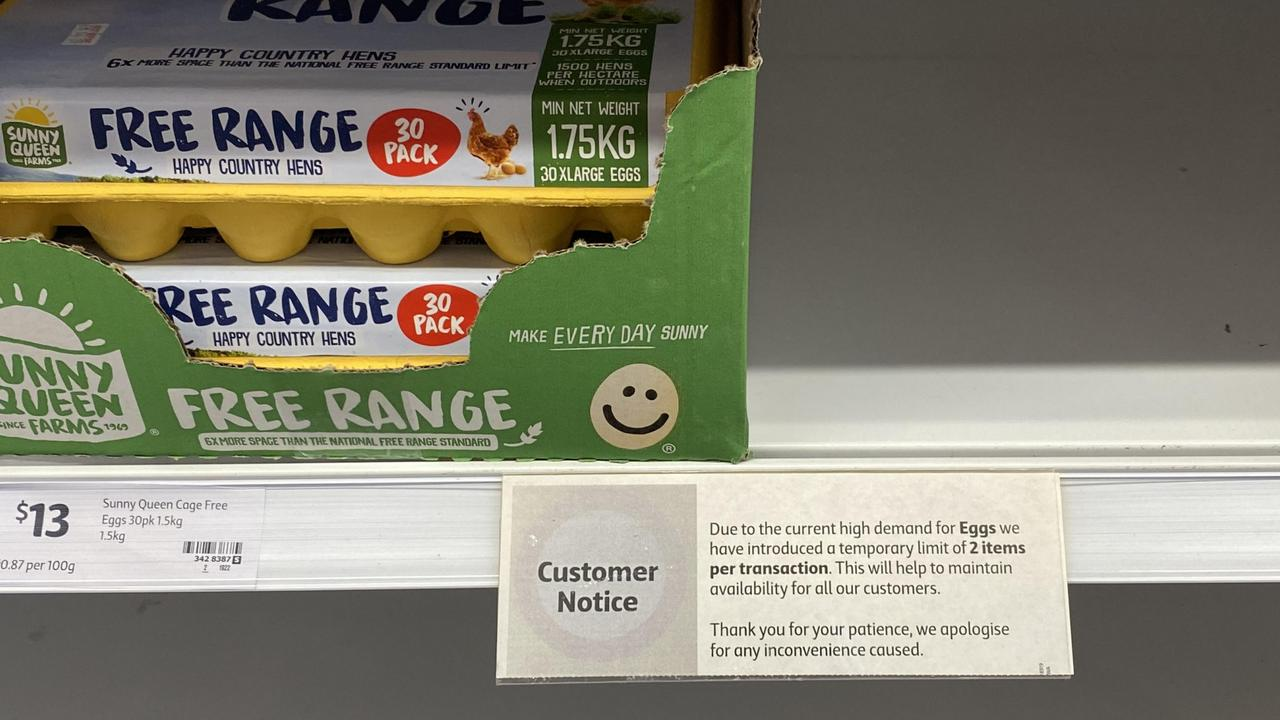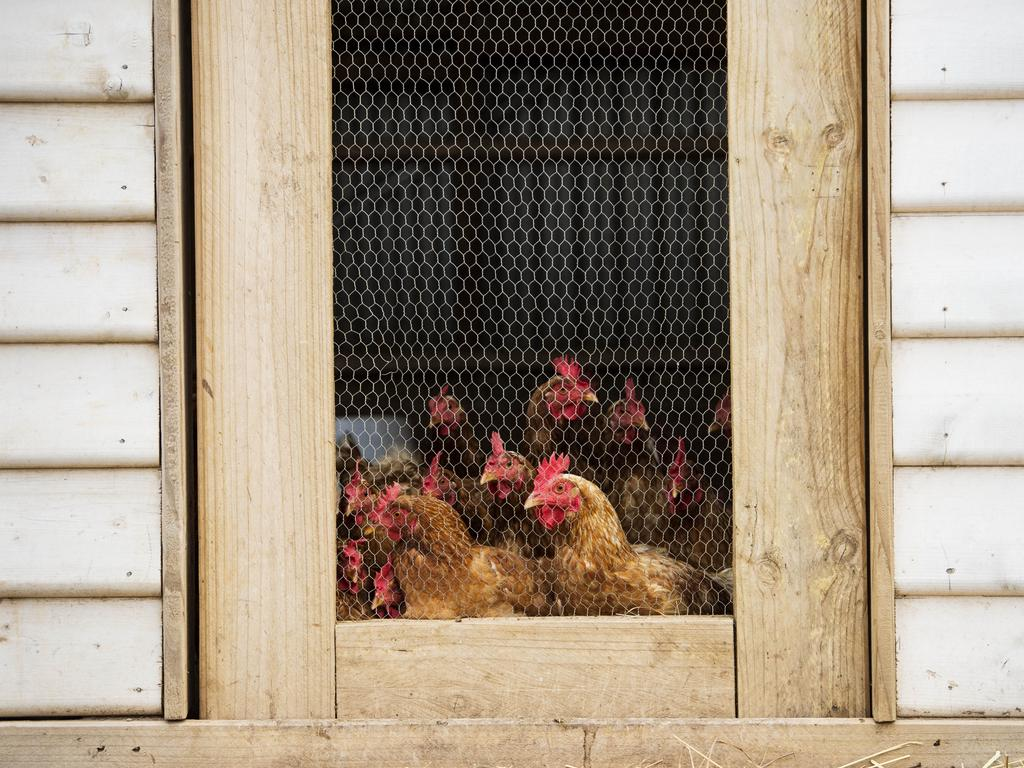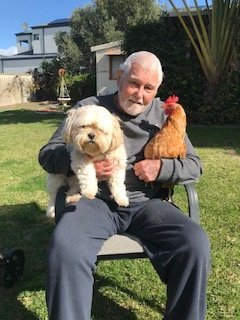Egg Shortage: Australian supermarkets and farmers are 'scrambling' to find solutions
- Replies 12
There really isn't anything that can compare to eggs for breakfast, is there? Because they are so delicious and high in protein, eggs are a fantastic way to kickstart your morning.
Recent reports, however, suggest that you might want to consider changing what you eat for breakfast in the coming weeks...
Eggs are the latest food item affected by supply chain issues as consumers switch to free-range eggs in response to growing production costs, harsh weather events, and a lack of labour.
Farmers are struggling to meet demand after reducing their chicken numbers during the lockdown, and supermarkets all around the country are now again imposing purchasing limits.

One photo reveals a crisis affecting a popular breakfast staple at supermarkets nationwide. Credit: News.com.au.
Customers are only permitted to purchase a maximum of two cartons of eggs per shop at Coles supermarket.
The retail giant stated that they were continuing to check supply and that they would keep their consumers informed of any changes to the situation.
Fortunately, purchase restrictions have not yet been implemented at Woolies, even though availability is a significant problem there as well.
A representative for the supermarket said that the large number of locally made eggs on the market had caused some farms to stop making eggs.
'While we continue to deliver eggs to our stores regularly, customers may notice reduced availability at the moment, and we thank them for their patience and understanding,' they said.
'We're in close contact with our suppliers and are working to increase the availability of eggs in stores as soon as possible.'
Southwest of Melbourne, Chooks at the Rooke is a free-range egg farm owned by Xavier Prime. In a recent interview, he told 3AW Radio that part of the problem was that the cold weather made the birds lay eggs less often.
'Part of it is the time of the year as well,' he said. 'Free-range eggs, in that sort of space, the birds are open to the elements, and with the daylight hours being shorter, that has a lot to do with how many eggs the chickens lay.'
Mr Prime said that hens need 15–16 hours of daylight every day in order to lay the 'optimum' number of eggs, but at the moment, they are only getting 10–11 hours.
Free-range chickens are required to have access to the outdoors for a minimum of eight hours each day in accordance with laws that took effect in 2018. Due to the cooler temperatures and shorter daylight hours, egg farmers claim that this made it difficult for their hens to lay eggs during the winter.

Colder temperatures and longer nights cause free-range hens to lay fewer eggs in winter. Credit: Zoe Phillip.
Rowan McMonnies, the managing director of Australian Eggs, said that while some people thought that free-range eggs were to blame for the empty shelves, there were a lot of other things going on.
'Free-range production is more complex than other systems as there are more variables to manage, including seasonal weather conditions,' he said.
'Egg farmers are usually able to meet demand across the year through planning but COVID disruption has made this difficult.'
According to McMonnies, after the lockdown ended last year, there was a sharp decline in egg demand, which told producers that consumers did not need as many eggs.
However, demand has recovered far more quickly than anticipated, and over the past 12 months, demand for eggs has skyrocketed.
'Retail volumes are only down slightly on this time last year, which was at an elevated position due to the COVID lockdowns,' McMonnies said.
'Cafes and restaurants appear to have also bounced back faster than anticipated as diners have made up for lost time.'
McMonnies reassured customers that the egg industry is resilient and that because there are different ways to make eggs, customers would still have a lot of choices.
'Egg farmers will respond to the current shortages to ensure demand will be met going forward.'
You heard it here first, folks! There are still plenty of eggs for everyone, so don't be alarmed. There may be a few restrictions in place for a few weeks, but we're confident that our favourite free-range eggs will return to the shelves.
We might swap to quick oats in the meantime. What are your thoughts? Share them with us in the comments below!
Recent reports, however, suggest that you might want to consider changing what you eat for breakfast in the coming weeks...
Eggs are the latest food item affected by supply chain issues as consumers switch to free-range eggs in response to growing production costs, harsh weather events, and a lack of labour.
Farmers are struggling to meet demand after reducing their chicken numbers during the lockdown, and supermarkets all around the country are now again imposing purchasing limits.
One photo reveals a crisis affecting a popular breakfast staple at supermarkets nationwide. Credit: News.com.au.
Customers are only permitted to purchase a maximum of two cartons of eggs per shop at Coles supermarket.
The retail giant stated that they were continuing to check supply and that they would keep their consumers informed of any changes to the situation.
Fortunately, purchase restrictions have not yet been implemented at Woolies, even though availability is a significant problem there as well.
A representative for the supermarket said that the large number of locally made eggs on the market had caused some farms to stop making eggs.
'While we continue to deliver eggs to our stores regularly, customers may notice reduced availability at the moment, and we thank them for their patience and understanding,' they said.
'We're in close contact with our suppliers and are working to increase the availability of eggs in stores as soon as possible.'
Southwest of Melbourne, Chooks at the Rooke is a free-range egg farm owned by Xavier Prime. In a recent interview, he told 3AW Radio that part of the problem was that the cold weather made the birds lay eggs less often.
'Part of it is the time of the year as well,' he said. 'Free-range eggs, in that sort of space, the birds are open to the elements, and with the daylight hours being shorter, that has a lot to do with how many eggs the chickens lay.'
Mr Prime said that hens need 15–16 hours of daylight every day in order to lay the 'optimum' number of eggs, but at the moment, they are only getting 10–11 hours.
Free-range chickens are required to have access to the outdoors for a minimum of eight hours each day in accordance with laws that took effect in 2018. Due to the cooler temperatures and shorter daylight hours, egg farmers claim that this made it difficult for their hens to lay eggs during the winter.
Colder temperatures and longer nights cause free-range hens to lay fewer eggs in winter. Credit: Zoe Phillip.
Rowan McMonnies, the managing director of Australian Eggs, said that while some people thought that free-range eggs were to blame for the empty shelves, there were a lot of other things going on.
'Free-range production is more complex than other systems as there are more variables to manage, including seasonal weather conditions,' he said.
'Egg farmers are usually able to meet demand across the year through planning but COVID disruption has made this difficult.'
According to McMonnies, after the lockdown ended last year, there was a sharp decline in egg demand, which told producers that consumers did not need as many eggs.
However, demand has recovered far more quickly than anticipated, and over the past 12 months, demand for eggs has skyrocketed.
'Retail volumes are only down slightly on this time last year, which was at an elevated position due to the COVID lockdowns,' McMonnies said.
'Cafes and restaurants appear to have also bounced back faster than anticipated as diners have made up for lost time.'
McMonnies reassured customers that the egg industry is resilient and that because there are different ways to make eggs, customers would still have a lot of choices.
'Egg farmers will respond to the current shortages to ensure demand will be met going forward.'
You heard it here first, folks! There are still plenty of eggs for everyone, so don't be alarmed. There may be a few restrictions in place for a few weeks, but we're confident that our favourite free-range eggs will return to the shelves.
We might swap to quick oats in the meantime. What are your thoughts? Share them with us in the comments below!








